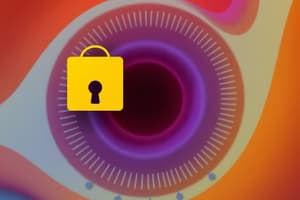Podcast
Questions and Answers
What are the four main components of a Computer System?
What are the four main components of a Computer System?
- Hardware (correct)
- Application programs (correct)
- Operating System (correct)
- Users (correct)
What are the three main purposes of an Operating System?
What are the three main purposes of an Operating System?
- To manage system resources (correct)
- To make it easier for users to interact with computer (correct)
- To control the execution of application software (correct)
What is an Operating System?
What is an Operating System?
An operating system is a program that manages a computer's hardware as well as providing an environment for applications programs to run on.
What are two different strategies to running multiple programs at a time on a computer system?
What are two different strategies to running multiple programs at a time on a computer system?
What are the four main computer system resources managed by an Operating System?
What are the four main computer system resources managed by an Operating System?
What activities does an Operating System do to manage processes?
What activities does an Operating System do to manage processes?
What activities does an Operating System do to manage memory?
What activities does an Operating System do to manage memory?
What activities does an Operating System do to manage file storage?
What activities does an Operating System do to manage file storage?
What activities does an Operating System do to manage mass storage?
What activities does an Operating System do to manage mass storage?
What activities does an Operating System do to manage I/O devices?
What activities does an Operating System do to manage I/O devices?
What is the difference between protection and security?
What is the difference between protection and security?
List and describe eight types of computer system environments.
List and describe eight types of computer system environments.
What are two hardware features that are used to support an Operating System and how do they work?
What are two hardware features that are used to support an Operating System and how do they work?
Flashcards are hidden until you start studying
Study Notes
Computer System Components
- Four main components: Hardware, Operating System, Application programs, Users.
Purposes of an Operating System
- Facilitates user interaction with the computer.
- Controls application software execution.
- Manages system resources.
Definition of Operating System
- A program that oversees hardware management and provides an environment for application execution.
Strategies for Running Multiple Programs
- Multiprogramming: Ensures the CPU is always executing an instruction by running multiple programs concurrently.
- Timesharing: Extends multiprogramming by allowing the CPU to switch among jobs, requiring some user interaction.
Resources Managed by the Operating System
- Four main resources: Processes, Memory, Storage, I/O Devices.
Process Management Activities
- Schedules processes and threads on the CPU.
- Handles creation and deletion of both user and system processes.
- Suspends and resumes processes as needed.
- Provides synchronization mechanisms and methods for process communication.
- Manages deadlock handling mechanisms.
Memory Management Activities
- Tracks used memory and ownership.
- Decides on processes moving in/out of memory.
- Allocates and deallocates memory space as required.
File Storage Management Activities
- Manages file creation and deletion.
- Controls access permissions for files.
- Organizes files through directory management.
- Provides support for file manipulation and maps files to secondary storage.
- Handles backing up files on nonvolatile storage.
Mass Storage Management Activities
- Manages free space.
- Allocates storage resources.
- Handles disk scheduling tasks.
Difference Between Protection and Security
- Protection: Mechanisms that control user and process access to the system.
- Security: Measures taken to defend against internal and external threats.
Types of Computer System Environments
- Traditional: General-purpose computer environment for diverse tasks.
- Mobile Computing: Portable devices like smartphones and tablets.
- Distributed Systems: Networked separate systems offering resource access.
- Client-server: A central server manages computations for connected terminals.
- Peer-to-Peer: Systems can act as both client and server based on service needs.
- Virtualization: Allows one OS to run applications from another OS.
- Cloud Computing: Internet-based delivery of computing resources and applications.
- Real-time Embedded Systems: Specialized computers designed for specific tasks with limited features.
Hardware Features Supporting Operating Systems
- Interrupts: Triggered by hardware or software events, transferring control to an interrupt service routine for handling the event and returning to the original program.
- Mode Bit: Enables two execution modes:
- User Mode: For application execution.
- Privilege Mode: For operating system execution, allowing privileged instructions for system control tasks.
Studying That Suits You
Use AI to generate personalized quizzes and flashcards to suit your learning preferences.




